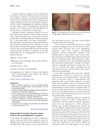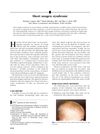 128 citations,
September 2003 in “Journal of Ethnopharmacology”
128 citations,
September 2003 in “Journal of Ethnopharmacology” Hibiscus rosa-sinensis leaf extract helps hair grow longer and faster.
 13 citations,
October 2017 in “Bioscience, Biotechnology, and Biochemistry”
13 citations,
October 2017 in “Bioscience, Biotechnology, and Biochemistry” Centella asiatica extract may help promote hair growth by blocking a specific cell signaling pathway.
 25 citations,
July 2017 in “Archives of Dermatological Research”
25 citations,
July 2017 in “Archives of Dermatological Research” Herbal products might promote hair growth with fewer side effects, but more research is needed to confirm their safety and effectiveness.
 3 citations,
January 2023 in “Physiological Research”
3 citations,
January 2023 in “Physiological Research” Conditioned media from mesenchymal stem cells show promise for tissue repair and disease treatment, but more research is needed on their safety and effectiveness.
 56 citations,
August 2005 in “Journal of Investigative Dermatology Symposium Proceedings”
56 citations,
August 2005 in “Journal of Investigative Dermatology Symposium Proceedings” Different women's hair and skin glands respond to hormones in varied ways, which can cause unwanted hair growth even with normal hormone levels, and more research is needed to treat this effectively.
 May 2024 in “Drug discovery today”
May 2024 in “Drug discovery today” Thyroid receptor β can help develop new drugs to treat hair loss.
 305 citations,
February 2007 in “Hormone and metabolic research”
305 citations,
February 2007 in “Hormone and metabolic research” Human skin makes sexual hormones that affect hair growth, skin health, and healing; too much can cause acne and hair loss, while treatments can manage these conditions.
 1 citations,
May 2007 in “International Journal of Dermatology”
1 citations,
May 2007 in “International Journal of Dermatology” Minoxidil, when applied to the scalp, can stimulate hair growth but effects vary, stop if treatment ends, and it may cause side effects like fluid retention.
 134 citations,
January 2010 in “Biomedical research”
134 citations,
January 2010 in “Biomedical research” Low oxygen conditions increase the hair-growing effects of substances from fat-derived stem cells by boosting growth factor release.
 44 citations,
December 1991 in “Annals of the New York Academy of Sciences”
44 citations,
December 1991 in “Annals of the New York Academy of Sciences” EGF and FGF help hair growth by affecting cell differentiation and fiber growth.
 13 citations,
December 1991 in “Annals of the New York Academy of Sciences”
13 citations,
December 1991 in “Annals of the New York Academy of Sciences” Researchers created a lab model to study human hair growth, showing it can grow and self-regulate outside the body.
 3 citations,
October 2007 in “Expert Review of Dermatology”
3 citations,
October 2007 in “Expert Review of Dermatology” Hair ages due to various factors and treatments like minoxidil and finasteride can help, but more research and better public awareness are needed.
 52 citations,
September 2018 in “International Journal of Molecular Sciences”
52 citations,
September 2018 in “International Journal of Molecular Sciences” Ginseng and its compounds may help hair growth and prevent hair loss, but more human trials are needed to confirm this.
 1 citations,
September 2022 in “Evidence-based Complementary and Alternative Medicine”
1 citations,
September 2022 in “Evidence-based Complementary and Alternative Medicine” Gardenia florida fruit extract may help hair grow and needs more research to understand how.
 14 citations,
November 2013 in “PloS one”
14 citations,
November 2013 in “PloS one” HGF/SF increases skin melanocytes but doesn't change melanin type or amount.
 98 citations,
December 2003 in “The FASEB Journal”
98 citations,
December 2003 in “The FASEB Journal” Thymosin β4 promotes hair growth by activating stem cells in hair follicles.
 April 2008 in “Obstetrics, gynaecology and reproductive medicine”
April 2008 in “Obstetrics, gynaecology and reproductive medicine” Hirsutism is often caused by high male hormone levels and can be treated with lifestyle changes and medications.
 3 citations,
May 2011 in “Journal of the American Academy of Dermatology”
3 citations,
May 2011 in “Journal of the American Academy of Dermatology” A woman's excessive hair growth around a leg ulcer was linked to a treatment with Prostaglandin E1 ointment.
 35 citations,
January 2020 in “Skin Pharmacology and Physiology”
35 citations,
January 2020 in “Skin Pharmacology and Physiology” The review concluded that keeping the hair-growing ability of human dermal papilla cells is key for hair development and growth.
 February 2024 in “International Journal of Health and Pharmaceutical”
February 2024 in “International Journal of Health and Pharmaceutical” Black rice extract ointment significantly promotes hair growth in Wistar rats.
 July 2021 in “IntechOpen eBooks”
July 2021 in “IntechOpen eBooks” Ginseng, especially its component ginsenosides, can promote hair growth, reduce hair loss, and potentially treat conditions like alopecia by affecting cell pathways and cytokines.
2 citations,
July 2023 in “Water” Tradescantia plants can effectively test for the toxicity of harmful algae.
 70 citations,
April 1990 in “Journal of The American Academy of Dermatology”
70 citations,
April 1990 in “Journal of The American Academy of Dermatology” Minoxidil treatment increased hair growth for up to 5 years, requiring twice daily application.
 8 citations,
January 2014 in “BioMed Research International”
8 citations,
January 2014 in “BioMed Research International” Eclipta alba extract was found to be effective in promoting hair growth in hairless mice.
 1 citations,
February 2021 in “Cosmetics”
1 citations,
February 2021 in “Cosmetics” Fagraea berteroana fruit extract may promote hair growth by affecting cell proliferation and hair growth pathways.
 26 citations,
March 1985 in “International Journal of Dermatology”
26 citations,
March 1985 in “International Journal of Dermatology” Minoxidil helps hair growth, but results vary.
 November 2020 in “Bali Medical Journal”
November 2020 in “Bali Medical Journal” PRP may help hair growth in alopecia areata without major side effects, but more research is needed.
 37 citations,
July 2005 in “Journal of The American Academy of Dermatology”
37 citations,
July 2005 in “Journal of The American Academy of Dermatology” Short anagen syndrome involves a hair growth phase lasting 1.5 years.
 80 citations,
April 2006 in “Clinical Interventions in Aging”
80 citations,
April 2006 in “Clinical Interventions in Aging” Minoxidil and Finasteride are effective for male baldness; more research is needed for hair aging treatments.
 3 citations,
February 2008 in “Basic and clinical dermatology”
3 citations,
February 2008 in “Basic and clinical dermatology” Telogen Effluvium is a hair loss condition where treatment involves identifying and managing its triggers.





























